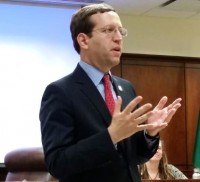Advocates Urge Election Law Changes to Encourage the Poor to Vote

The United States Voting Rights Act may be 50 years old, but local officials and community activists are advocating change as concerns remain that many low-income and minority voters are inadequately represented.
A direct correlation exists between income level and voter turnout, said Julie Ebenstein of the American Civil Liberties Union. Last year 80 percent of people with an annual income of at least $150,000, roughly twice as much as those who earn less, voted.
At an April 30 forum in Greenburgh run by Westchester for Change, a community organization working for progressive social and political change, Ebenstein said a variety of barriers has prevented low-income voters from participating as much as wealthier individuals. For example, New York does not allow early voting, meaning if someone can’t make it to the polls on Election Day they are unable to vote. This largely impacts low-income voters because they are more likely to work for an hourly wage and, therefore, less likely to take time off to vote, Ebenstein said.
In addition, voter identification requirements largely affect low-income and minority citizens, she contended. More than 300,000 citizens statewide don’t have a required government-issued I.D., such as a driver’s license or passport. That number is disproportionately comprised of African-Americans and Latinos, Ebenstein said.
“Economic inequality, I want to suggest to you, is the greatest threat to our democracy,” said Assemblyman Tom Abinanti (D-Pleasantville), who attended the forum.
Kristina Andreatta, deputy organizer for Citizen Action of New York, explained that low-income voters failing to show up at the polls has a negative public policy impact on them, since many politicians then don’t have an incentive to respond to their needs. Therefore, it creates a cycle in which politicians pass laws that benefit wealthier citizens, creating even more economic inequality and leading the poor to believe that politicians fail to work for them, she said.
A survey of nonvoters nationwide revealed that 41 percent felt that their vote didn’t matter, according to Andreatta. Meanwhile, 59 percent responded that politicians make empty promises and don’t accomplish anything.
Assemblyman David Buchwald (D-White Plains), who was recently named chairman of the Election Law Subcommittee on Election Day Operations and Voter Disenfranchisement, said it’s critical for those who feel disenfranchised to speak out and vote. Many local officials welcome input from the public on problems and solutions, he said.
“Too many people are cynical when it comes to government and they don’t know what I know, which is that government, when it’s used right, can really help people, empower them to better their lives, improve their families and get involved in their communities,” Buchwald said. “So many people, they have real issues and they don’t even think to turn to their state assemblyman or state senator.”
Along with raising minimum wage, advocates and officials said changing voter I.D. laws and the introduction of early voting in the state would help to reduce inequities. New York has one of the lowest turnouts of minority and poor voters, Andreatta said.
“If at least you go to the polls and you vote, you have an opportunity to transform your lives by transforming the people who are making the laws that dictate what happens in your life,” said state Sen. Andrea Stewart-Cousins (D-Yonkers).
Stewart-Cousins is sponsoring a bill that would permit voting up to three weeks before the general election. Buchwald and fellow Assembly Democrats Sandy Galef and Amy Paulin are sponsoring a matching bill in the Assembly. While these measures have generally been supported in the Assembly, they often meet roadblocks in the Republican-controlled Senate, Stewart-Cousins sai

Examiner Media – Keeping you informed with professionally-reported local news, features, and sports coverage.
